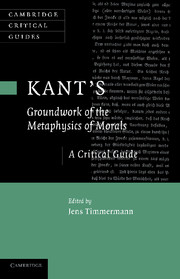Book contents
- Frontmatter
- Contents
- List of contributors
- List of translations and abbreviations
- Introduction
- 1 Ethics and anthropology in the development of Kant's moral philosophy
- 2 Happiness in the Groundwork
- 3 Acting from duty: inclination, reason and moral worth
- 4 Making the law visible: the role of examples in Kant's ethics
- 5 The moral law as causal law
- 6 Dignity and the formula of humanity
- 7 Kant's kingdom of ends: metaphysical, not political
- 8 Kant against the ‘spurious principles of morality’
- 9 Autonomy and impartiality: Groundwork III
- 10 Problems with freedom: Kant's argument in Groundwork III and its subsequent emendations
- 11 Freedom and reason in Groundwork III
- Bibliography
- Index
10 - Problems with freedom: Kant's argument in Groundwork III and its subsequent emendations
Published online by Cambridge University Press: 04 August 2010
- Frontmatter
- Contents
- List of contributors
- List of translations and abbreviations
- Introduction
- 1 Ethics and anthropology in the development of Kant's moral philosophy
- 2 Happiness in the Groundwork
- 3 Acting from duty: inclination, reason and moral worth
- 4 Making the law visible: the role of examples in Kant's ethics
- 5 The moral law as causal law
- 6 Dignity and the formula of humanity
- 7 Kant's kingdom of ends: metaphysical, not political
- 8 Kant against the ‘spurious principles of morality’
- 9 Autonomy and impartiality: Groundwork III
- 10 Problems with freedom: Kant's argument in Groundwork III and its subsequent emendations
- 11 Freedom and reason in Groundwork III
- Bibliography
- Index
Summary
PROBLEMS WITH FREEDOM
In the first two sections of the Groundwork for the Metaphysics of Morals, Kant has offered an analytical argument for his claim that the categorical imperative is the fundamental principle of morality. In Section I, he has argued that the imperative ‘I ought never to act except in such a way that I could also will that my maxims should become a universal law’ (G IV 402) is derivable by the analysis of ‘common rational moral cognition’, specifically from commonsense conceptions of the good will (G IV 393–6) and of duty, which is the concept of good will with the addition of ‘certain subjective limitations and hindrances’ (G IV 397) that are inescapable for human beings, namely the fact that our inclinations do not always and only coincide with the demands of morality. In Section II, he has argued that the categorical imperative, which has now been represented as a system of formulas of which the specific formulation derived in Section I is only the first, is derivable by analysis of the ‘universal concept of a rational being as such’ (G IV 412), or, more accurately, from the general concept of a rational being with a will, or a rational agent (G IV 412 and IV 427). But in both cases, Kant claims, the mere analysis that suffices to determine the content of the fundamental principle of morality does not by itself prove that this principle is binding for us actual human beings.
Keywords
Information
- Type
- Chapter
- Information
- Kant's 'Groundwork of the Metaphysics of Morals'A Critical Guide, pp. 176 - 202Publisher: Cambridge University PressPrint publication year: 2009
Accessibility standard: Unknown
Why this information is here
This section outlines the accessibility features of this content - including support for screen readers, full keyboard navigation and high-contrast display options. This may not be relevant for you.Accessibility Information
- 11
- Cited by
